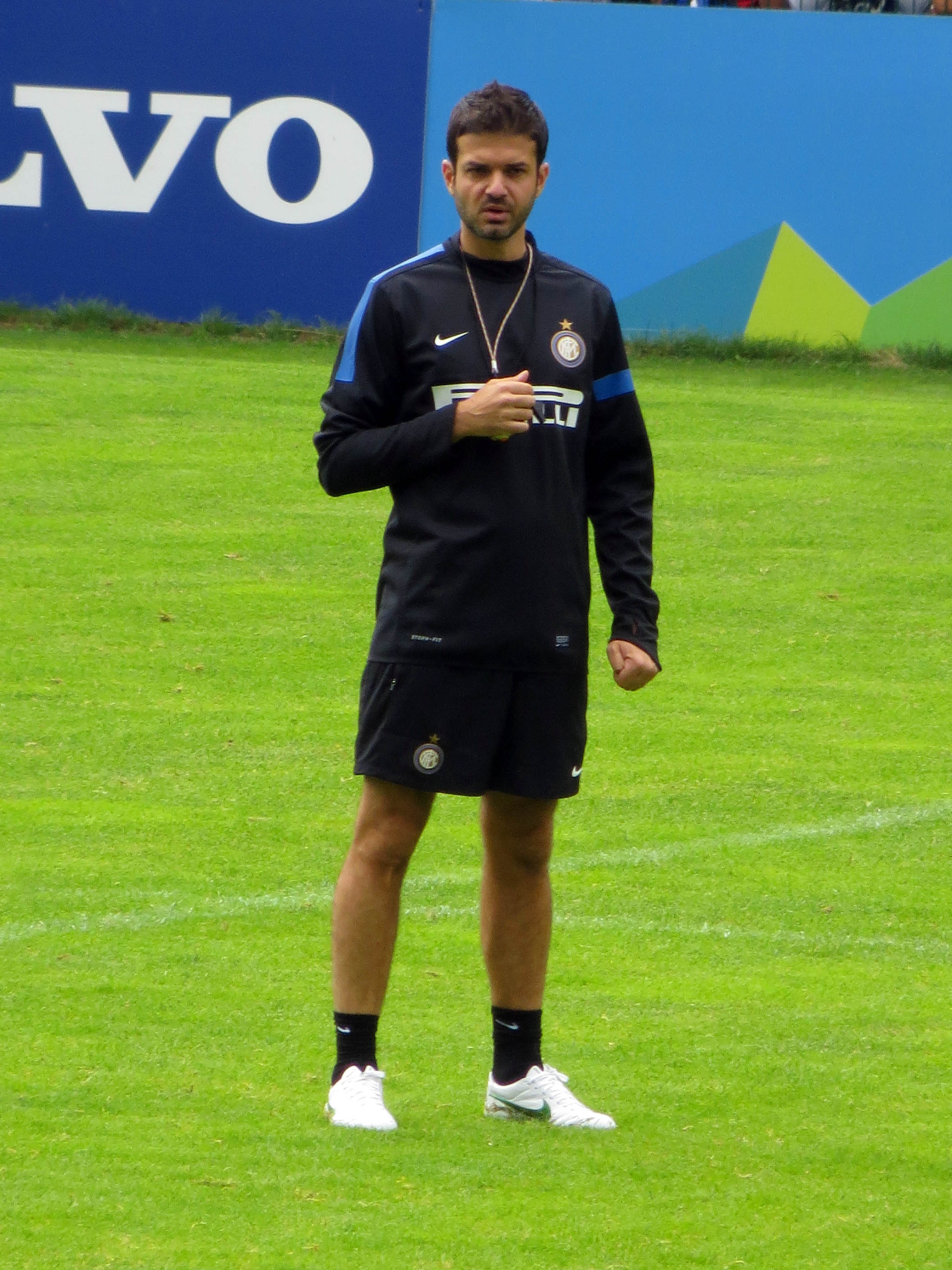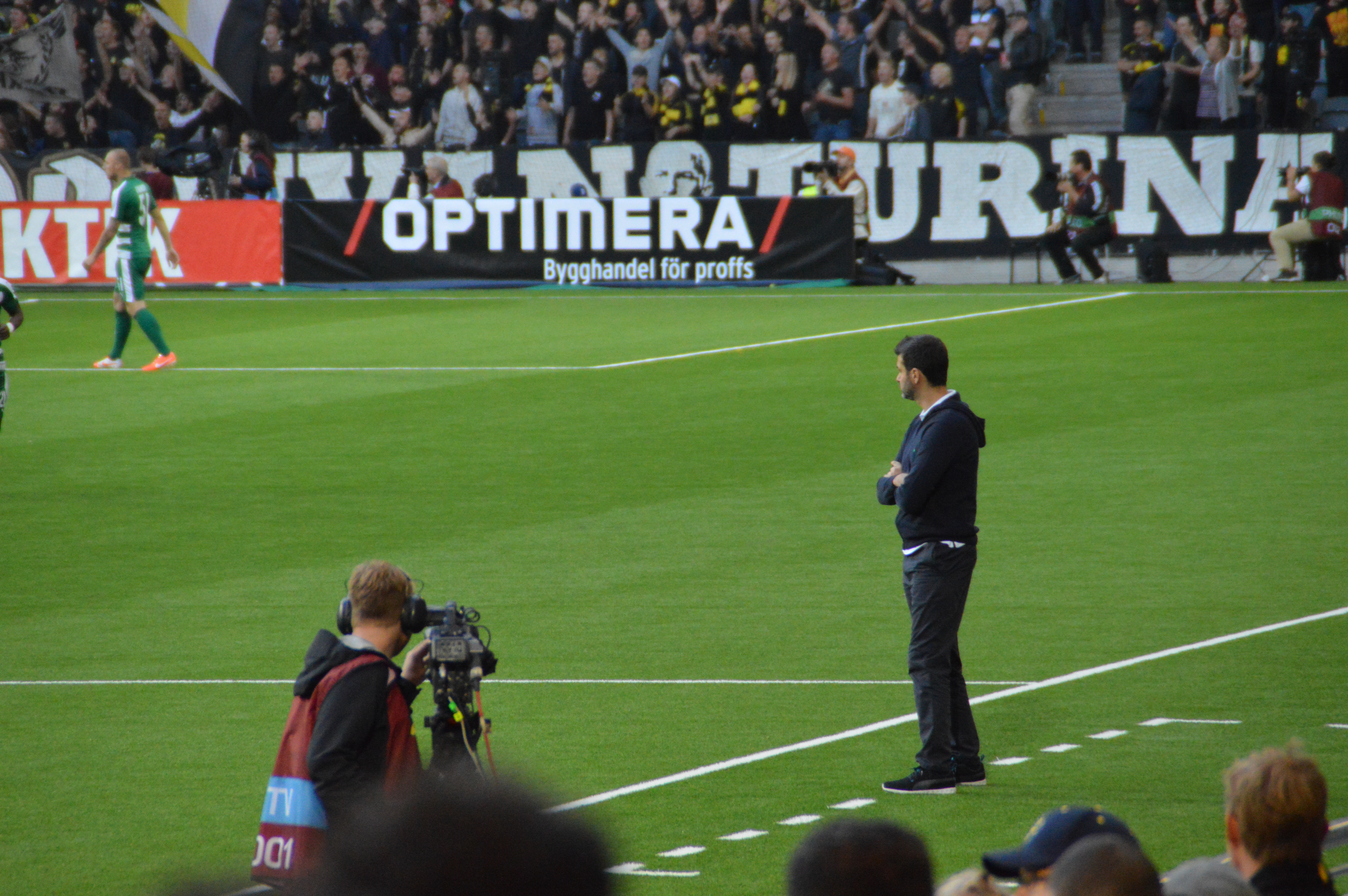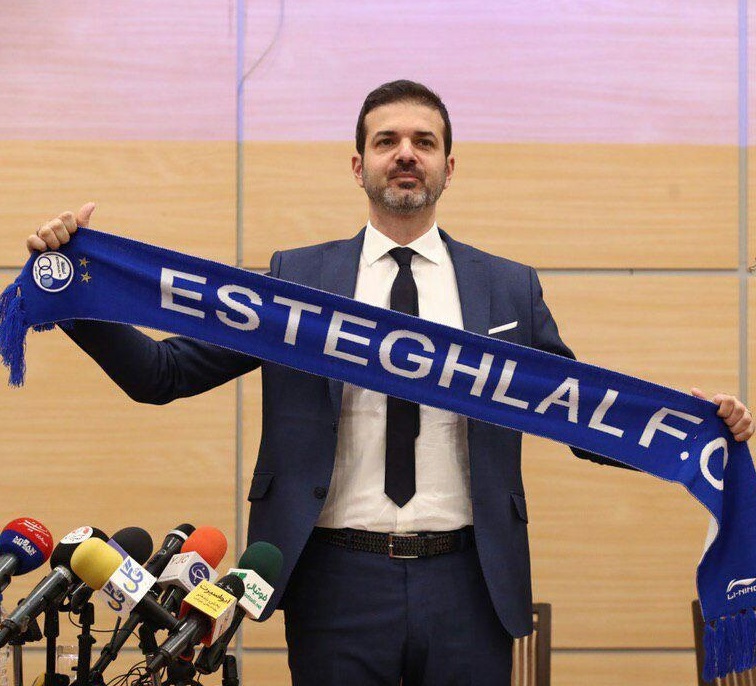1. Early Life and Playing Career
Andrea Stramaccioni's early life and playing career were shaped by his talent as a defender and an unfortunate injury that shifted his path towards coaching.
1.1. Birth and Education
Born on 9 January 1976 in Rome, Italy, Stramaccioni demonstrated an early aptitude for football. Beyond his athletic pursuits, he also committed to academic excellence, earning a law degree in 2010 from La Sapienza University of Rome, which is Italy's largest university.
1.2. Playing Career
Stramaccioni began his playing career as a defender, developing within the youth system of Romulea before moving to Bologna's Primavera (youth) team in 1990. In 1994, he was recognized as the best player at the Torneo Città di Vignola, a prestigious tournament for young Italian talents, indicating a promising future. However, his playing career was tragically cut short in the 1994-95 season. Shortly before he was due to sign a professional contract, he suffered a severe knee injury involving his right meniscus and ligament during a Serie C Coppa Italia match against Empoli. This collision forced him to retire from playing at a young age.
2. Coaching Career
Following the abrupt end to his playing days, Andrea Stramaccioni embarked on a coaching career that saw him rise through the ranks from amateur youth teams to managing prominent professional clubs in Italy and abroad.
2.1. Early Coaching and Youth Teams
Stramaccioni's coaching journey began at the grassroots level, where he quickly demonstrated a natural aptitude for managing and developing young talent. His successes with youth teams laid the foundation for his future in professional football.
2.1.1. Early Coaching Experience
After retiring as a footballer, Stramaccioni took an official junior coaching course in 2003. He began coaching a number of amateur youth teams. At the age of 25, he led the Rome-based youth team Az Sport to win a provincial title. Subsequently, he was hired by Romulea, his former youth club, where he worked until 2005, achieving several successes. During this period, Stramaccioni also served as a talent scout and an opponent observer for Crotone, which was then coached by Gian Piero Gasperini, providing him with valuable systematic analytical experience.
2.1.2. A.S. Roma Youth
In 2005, Stramaccioni joined the youth coaching staff at Roma, a move that came with a direct recommendation from Bruno Conti. During his six-year tenure, he coached three different youth categories and achieved significant success, winning two national titles: the Giovanissimi Nazionali in 2007 and the Allievi Nazionali in 2010. On 9 May 2009, Stramaccioni obtained his UEFA A coaching licence, which qualified him to work as a head coach for Lega Pro teams or as an assistant coach for Serie A and Serie B clubs. However, he did not possess the UEFA Pro Licence, which is required for a full head coaching role in the top Italian divisions, meaning he could only serve as a caretaker or vice-coach. Despite his achievements, Roma was unable to promote him to coach their Primavera team as Alberto De Rossi (the father of Daniele De Rossi) already held that position and had won the 2011 championship. During his coaching course, Stramaccioni met Roberto Samaden, who had been the director of Inter Milan's youth academy since 2006. This connection would prove crucial for his next career move.
2.1.3. Inter Milan Primavera
In mid-2011, following the departure of Fulvio Pea to become head coach of Sassuolo, Roberto Samaden and Ernesto Paolillo, the CEO of Inter Milan, offered Stramaccioni the vacant coaching position for Inter's Primavera (U-19) team. This offer was part of a package deal related to the transfer of Nicolás Burdisso. Inter Milan acted swiftly to secure Stramaccioni's services, giving him the freedom to design the Primavera coaching program, as many teams, including the Italian U-17 national team, were interested in him. Under his leadership, Inter Primavera finished first in Group B of their league, holding a record of 13 wins, four draws, and four losses, with 43 goals scored and 19 conceded, from 21 matches. Stramaccioni also guided Inter Primavera to the final of the 2011-12 NextGen Series, a prestigious competition considered the equivalent of the UEFA Champions League for junior teams. They defeated Sporting CP and Marseille to reach the final. On 25 March 2012, in the final played at Matchroom Stadium in London, Inter drew 1-1 with Ajax and subsequently won 5-3 in the penalty shoot-out, securing the NextGen Series title.
2.2. Senior Club Management
Stramaccioni's success with youth teams propelled him into the demanding world of senior club management, where he faced both triumphs and significant challenges across various European leagues and beyond.
2.2.1. Inter Milan

On 26 March 2012, just one day after Stramaccioni led Inter's Primavera to their NextGen Series victory, and following the first team's 2-0 defeat to Juventus, Claudio Ranieri was sacked as Inter Milan manager. Massimo Moratti, the club owner, and other high-ranking officials who had been celebrating the NextGen Series win in London, decided to promote Stramaccioni to caretaker manager of the first team. This appointment made him Inter's sixth youngest coach, and the youngest in 65 years, taking charge of a major club at just 36 years old without prior senior team management experience. He was initially considered an "unknown" coach. Due to his lack of a UEFA Pro Licence at the time, he worked alongside assistant coach Giuseppe Baresi.
Stramaccioni's debut for the first team was a thrilling 5-4 victory over Genoa at San Siro Stadium, a match featuring nine goals, two red cards (one for each team), and four penalties, three of which were awarded to the opposition. He led Inter to a sixth-place finish in the Serie A, notably securing a crucial victory in the Derby della Madonnina against cross-town rivals Milan, which ultimately cost Milan the Serie A title. His immediate positive impact led Moratti to confirm him as head coach for the 2012-13 season with a three-year contract until 2015. The FIGC granted him permission to sign the contract as he had been admitted to the 2012-13 coaching course to obtain his UEFA Pro Licence by June 2013.
On 7 October 2012, Stramaccioni guided Inter to a memorable 1-0 victory over Milan, emotionally declaring "è vostro, è vostro, questo derby è vostro" (Italian for "it's yours, it's yours, this derby is yours") to the Inter supporters at the end of the game. On 3 November 2012, he led Inter to an impressive 3-1 away victory against Juventus, who were unbeaten in 49 rounds at their Juventus Stadium. After the match, Stramaccioni remarked that the result "will send a signal, as we came here... against a team unbeaten in 49 rounds and attacked them with a trident." Despite these notable victories, the 2012-13 Serie A campaign proved difficult, marked by a spate of injuries within the squad. After 14 months in charge, Inter finished in ninth place, failing to qualify for European competition for the first time in 15 seasons. Consequently, on 24 May 2013, the club announced Stramaccioni's sacking, replacing him with Walter Mazzarri.
2.2.2. Udinese
On 4 June 2014, Stramaccioni was appointed as the new head coach of Udinese, taking over from Francesco Guidolin. His tenure lasted for one year. The team struggled under his leadership, finishing the 2014-15 Serie A season in 16th place. His contract expired at the end of June 2015, and he stepped down as head coach on 1 June 2015.
2.2.3. Panathinaikos

On 8 November 2015, Stramaccioni was appointed manager of Super League Greece club Panathinaikos, signing a one-and-a-half-year deal that was set to run until the end of the 2016-17 season. His first match in charge was the Greek Derby against Olympiacos on 22 November. However, the start of Panathinaikos' 2016-17 campaign proved disappointing. The team experienced a poor run of results, including defeats to Olympiacos (0-3), Xanthi (1-2), and Ajax (1-2 at home and 0-2 away). They were eliminated from the UEFA Europa League group stage with only one point from their first five fixtures. Growing fan outrage, further exacerbated by a 2-1 Greek Cup defeat to OFI, led chairman Giannis Alafouzos to terminate Stramaccioni's contract on 1 December 2016. He was replaced by Marinos Ouzounidis later that same day.
2.2.4. Sparta Prague
On 28 May 2017, Stramaccioni took charge of Sparta Prague, a Czech club, signing a two-year contract. He became the fourth foreign manager in the Czech First League. He brought his entire team of co-workers with him, consisting of five different nationalities, to the club. In July 2017, Sparta Prague was eliminated in the third qualifying round of the UEFA Europa League after losing both matches against Red Star Belgrade (0-2 away and 0-1 at home). Three months later, the team was also eliminated in the fourth round of the Czech Cup after losing at home (2-2 after extra time, 2-4 on penalties) against Baník Ostrava. On 6 March 2018, Stramaccioni was sacked as head coach of Sparta Prague following "a disappointing start to the second part of the season and overall bad results this season."
2.2.5. Esteghlal

On 13 June 2019, Stramaccioni was appointed coach of Iranian club Esteghlal, signing a two-year contract. He later revealed in an interview that a conversation with former Iran national volleyball team coach Julio Velasco convinced him to accept a coaching job in Iran. Upon his appointment, Stramaccioni immediately reshaped the squad, declaring that five players-Meysam Teymouri, Farshad Mohammadi Mehr, Armin Sohrabian, Rouhollah Bagheri, and Reza Karimi-were not part of his plans for the upcoming season. Instead, he requested the signing of two former Serie A players, Cheick Diabaté and Hrvoje Milić.
Stramaccioni's first competitive game as Esteghlal's coach resulted in a loss against Machine Sazi. However, the team's performance soon improved. On 28 December, his team achieved a significant 4-2 victory over Tractor, a win that made Esteghlal the first team to accumulate over 1000 points in the all-time Persian Gulf Pro League table.
However, Stramaccioni's tenure at Esteghlal was marred by a significant controversy regarding unpaid wages. On 8 December, he resigned as manager, citing the club's failure to pay the coaching staff's wages. This issue was largely attributed to restrictions on transferring money outside Iran due to international sanctions. Following his departure, numerous Esteghlal fans protested in front of the offices of Iran's Ministry of Sport and Youth, which owns the club, to express their dissatisfaction with the club's management and Stramaccioni's departure. Despite negotiations for his return, the club officially announced his departure on 2 January 2020, confirming that the talks were unsuccessful.
2.2.6. Al Gharafa
In July 2021, Stramaccioni took charge of Qatari club Al Gharafa. His most recent coaching role concluded on 31 October 2022, when he was dismissed by Al Gharafa.
3. Coaching Style and Philosophy
Andrea Stramaccioni's coaching style and philosophy are characterized by a systematic approach, drawing from his background as a talent scout and opponent observer. He is known for his perfectionism, strong work ethic, and ability to motivate players. While his favored formation is typically a 4-2-3-1, he demonstrates flexibility, adapting his tactical schemes to 4-4-1-1 or 4-3-1-2 based on the characteristics and distribution of his players, rather than forcing them into rigid roles. His systematic methodology in preparing and analyzing matches has often been compared to that of José Mourinho.
4. Personal Life
Andrea Stramaccioni is married to Dalila, an Instagram influencer. They have been married since 2011 and have four children together, with their youngest child born in 2022 in Doha, Qatar. Beyond his coaching career, Stramaccioni has also engaged in public commentary on football. As an expert on international and Qatari football, he was hired by RAI as a color commentator for the 2022 FIFA World Cup. His commentary during the Argentina vs Saudi Arabia game garnered significant attention across social media due to its intense and passionate delivery.
5. Honours
Andrea Stramaccioni has achieved several titles throughout his career as a player and especially as a manager, particularly at the youth level.
Playing Honours
- Serie C: 1994-95 (with Bologna)
Youth Coaching Honours
- Amateur Championship (Rome provincial title): 2002-03 (with Az Sport)
- Giovanissimi Nazionali: 2006-07 (with Roma)
- Allievi Nazionali: 2009-10 (with Roma)
Managerial Honours
- NextGen Series: 2011-12 (with Inter Milan Primavera)
6. Managerial Statistics
| Team | From | To | Record | ||||
|---|---|---|---|---|---|---|---|
| G | W | D | L | Win % | |||
| Inter Milan | 26 March 2012 | 24 May 2013 | 31|11|23|47.69 | ||||
| Udinese | 4 June 2014 | 30 June 2015 | 12|12|17|29.27 | ||||
| Panathinaikos | 9 November 2015 | 1 December 2016 | 22|14|16|42.31 | ||||
| Sparta Prague | 28 May 2017 | 6 March 2018 | 10|7|6|43.48 | ||||
| Esteghlal | 13 June 2019 | 8 December 2019 | 9|4|2|60.00 | ||||
| Al Gharafa | 2 July 2021 | 31 October 2022 | 21|12|20|39.62 | ||||
| Total | 115|71|89|41.82 | ||||||
7. Reception and Legacy
Andrea Stramaccioni's career as a football manager has elicited a mixed reception, characterized by early promise at the youth level, followed by consistent challenges in senior club management.
7.1. General Evaluation
Stramaccioni is widely regarded for his exceptional abilities as a youth coach. His tenure at Roma's youth academy, where he secured multiple national titles, and particularly his success in leading Inter's Primavera team to the NextGen Series championship, solidified his reputation as a developer of young talent. These achievements sparked high expectations for his transition to senior club management. However, his career at the senior level has been marked by a recurring pattern of short tenures and fluctuating results across various clubs. This has often led to a contrast in evaluation, with his strong record in youth development often highlighted against the more challenging and less consistent outcomes of his professional club management roles.
7.2. Challenges and Controversies
A notable aspect of Stramaccioni's senior management career has been the frequent dismissals and associated controversies. At Inter Milan, despite an initial positive impact, the team's subsequent ninth-place finish in Serie A and failure to qualify for European competition led to his sacking. His time at Panathinaikos concluded amidst fan outrage due to poor results, including early elimination from the UEFA Europa League and a Greek Cup defeat. Similarly, his spell at Sparta Prague ended with dismissals following unsatisfactory performances in both domestic and European competitions.
His most notable controversy, however, occurred during his time at Esteghlal in Iran. Stramaccioni's departure was triggered by the club's failure to pay the wages of his coaching staff, a problem complicated by international sanctions that made transferring money outside Iran extremely difficult. This situation led to widespread protests by Esteghlal fans outside the offices of Iran's Ministry of Sport and Youth, which owns the club, to express their dissatisfaction with the club's management and Stramaccioni's departure. Despite negotiations for his return, these efforts ultimately failed, highlighting the complex external factors that can impact a manager's career, particularly in geopolitically sensitive regions. This consistent pattern of dismissals, often stemming from performance issues or off-field controversies, remains a defining aspect of his managerial legacy.